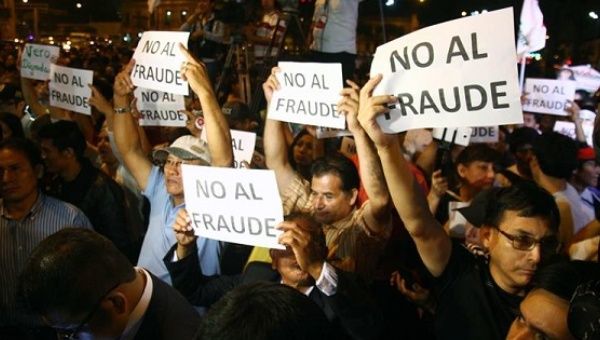Mining companies have benefitted over the past few years from rising global demand and prices, but workers have seen little to no benefit from the boom.
Now mine workers are flexing their muscle to demand their share of the spoils.
Mining companies have benefitted over the past few years from rising global demand and prices, but workers have seen little to no benefit from the boom.
Now mine workers are flexing their muscle to demand their share of the spoils.
 Supporters of leftist candidate Veronika Mendoza protest electoral fraud. Lima, April 10. Photo: EFE.
Peruvian left-wing presidential candidate Veronika Mendoza came third in the first round of Peru's presidential elections on April 10, behind former World Bank economist Pedro Pablo Kuczynski and Keiko Fujimoro, the daughter of a jailed ex-president.
Supporters of leftist candidate Veronika Mendoza protest electoral fraud. Lima, April 10. Photo: EFE.
Peruvian left-wing presidential candidate Veronika Mendoza came third in the first round of Peru's presidential elections on April 10, behind former World Bank economist Pedro Pablo Kuczynski and Keiko Fujimoro, the daughter of a jailed ex-president.
Peruvians took to the streets of the country's capital Lima in large numbers on February 25 to protest against the pro-corporate Trans-Pacific Partnership (TPP) involving 12 Pacific Rim nations.
Unionists, rural workers and environmentalists are coming together in Arequipa, in southern Peru, to halt the proposed Tia Maria copper mine. The mine project belongs to Southern Copper Corporation, a subsidiary of Grupo Mexico.
A 48-hour strike regional strike in the south of Peru defied a state of emergency on Mary 27 and 28, continuing to protest against Southern Copper Corp's unpopular Tia Maria mine.
 Photo: TeleSUR/Rael Mora.
A three-day general strike against the Tia Maria mining project of transnational Southern Copper Corporation in the southern region of Arequipa in Peru was launched on May 12.
Photo: TeleSUR/Rael Mora.
A three-day general strike against the Tia Maria mining project of transnational Southern Copper Corporation in the southern region of Arequipa in Peru was launched on May 12.